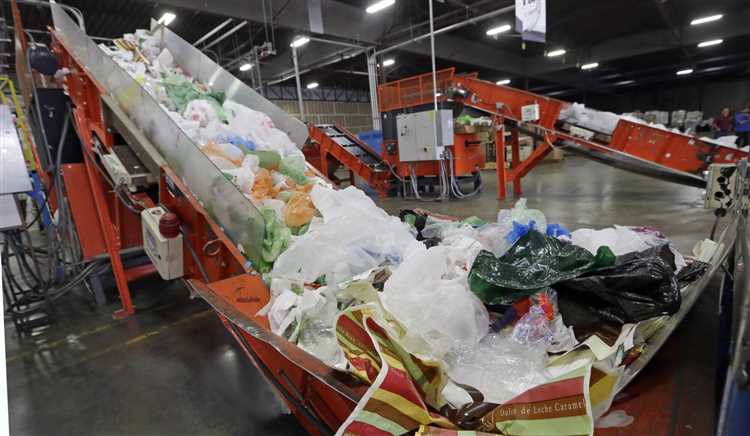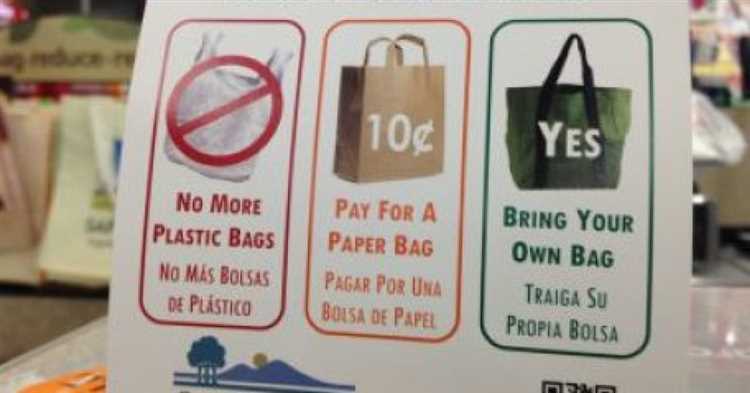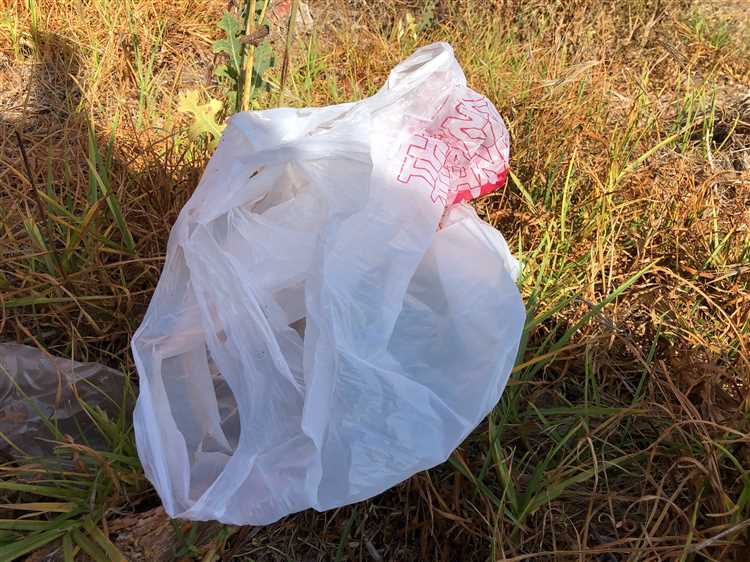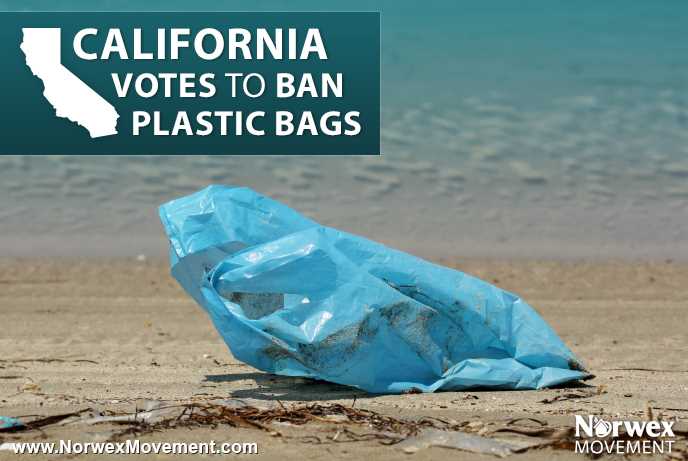California has been at the forefront of the environmental movement for years, and one of the most significant steps the state has taken to reduce its carbon footprint is the implementation of plastic bag bans. These bans aim to combat the detrimental effects of single-use plastic bags on the environment and encourage more sustainable alternatives.
The plastic bag bans in California were first introduced in 2014 when a statewide ban was enacted. Since then, many individual cities and counties have also implemented their own bans, each with its own unique set of regulations and restrictions. Understanding the specifics of these bans is crucial for residents, businesses, and visitors to ensure compliance and contribute to a cleaner and greener California.
Under the plastic bag bans, retailers are no longer allowed to distribute single-use plastic bags at checkout. Instead, customers are encouraged to bring their reusable bags or purchase paper bags for a small fee. However, there are exceptions to this rule, such as for certain types of bags like those used for meat, produce, or prescriptions. It’s important to be aware of these exceptions to avoid any confusion.
The benefits of plastic bag bans are numerous. Not only do they significantly reduce plastic waste, but they also help to protect wildlife, conserve natural resources, and decrease pollution. By shifting towards reusable bags, Californians can make a positive impact on the environment and contribute to a more sustainable future.
- Overview of Plastic Bag Bans in California
- Benefits of Plastic Bag Bans
- Challenges and Concerns
- Reasons for Implementing Plastic Bag Bans
- Impact of Plastic Bag Bans on the Environment
- 1. Reduction in Plastic Waste
- 2. Prevention of Plastic Pollution
- 3. Encouragement of Sustainable Alternatives
- Challenges and Controversies Surrounding Plastic Bag Bans
- Question-answer:
- What is a plastic bag ban?
- When did the plastic bag ban go into effect in California?
- Why was the plastic bag ban implemented in California?
- Are there any exceptions to the plastic bag ban in California?
- What are the consequences for retailers who do not comply with the plastic bag ban in California?
- What is a plastic bag ban?
Overview of Plastic Bag Bans in California

Plastic bag bans have become a major topic of discussion and legislation in recent years, especially in California. Due to concerns about the environmental impact of single-use plastic bags, many cities and counties in the state have implemented bans or fees for their use.
In 2014, California became the first state in the United States to pass a law banning single-use plastic bags at large retail stores. This law, known as Senate Bill 270, required stores to charge customers at least 10 cents for a paper or reusable bag or provide reusable bags free of charge. The goal of the legislation was to reduce litter, protect wildlife, and promote the use of more sustainable alternatives.
Since then, several cities and counties in California have implemented their own plastic bag bans or fees. These local ordinances may have varying requirements and exemptions, so it’s important to check the regulations in your specific area.
Benefits of Plastic Bag Bans

Plastic bag bans have numerous environmental benefits. By reducing the use of single-use plastic bags, these bans help to decrease litter and prevent plastic from ending up in waterways, where it can harm marine life.
Plastic bags are also a significant source of greenhouse gas emissions. The production of plastic bags requires the extraction of fossil fuels and the release of harmful pollutants into the air. By encouraging the use of reusable bags or paper bags, plastic bag bans help to reduce these emissions and mitigate climate change.
Challenges and Concerns

While plastic bag bans are generally well-intentioned, there have been some challenges and concerns associated with their implementation. Some critics argue that these bans disproportionately affect low-income communities, as residents may not be able to afford the cost of reusable bags.
Additionally, some people may find it difficult to remember to bring their own bags or may not have access to reusable bags when they need them. This can lead to frustration and inconvenience for shoppers.
Overall, plastic bag bans represent an important step towards reducing plastic waste and promoting more sustainable practices. By encouraging the use of reusable bags and reducing reliance on single-use plastic, California is leading the way in environmental protection.
Reasons for Implementing Plastic Bag Bans
There are several reasons why plastic bag bans have been implemented in California. One of the main reasons is to reduce the environmental impact of plastic bags. Plastic bags are a major source of pollution, particularly in oceans and waterways. They can take hundreds of years to decompose and can harm marine life.
Another reason for implementing plastic bag bans is to promote sustainable alternatives. By banning plastic bags, it encourages consumers to switch to reusable bags, such as cloth or canvas bags. These bags are more durable and can be used multiple times, reducing the need for single-use plastics.
Plastic bag bans also aim to reduce waste and conserve resources. By reducing the consumption of plastic bags, we can decrease the amount of waste that goes into landfills. Additionally, the production of plastic bags requires significant amounts of energy and resources, such as petroleum and water. Banning plastic bags helps to conserve these valuable resources.
Furthermore, plastic bag bans contribute to a cleaner and more attractive environment. Plastic bags often end up as litter on streets, parks, and beaches. This not only detracts from the beauty of these areas but also poses a hazard to wildlife and can clog storm drains. By implementing a ban, we can help to create cleaner and more enjoyable public spaces.
In conclusion, there are multiple reasons for implementing plastic bag bans in California. These bans aim to reduce pollution, promote sustainable alternatives, conserve resources, and create a cleaner environment. By eliminating plastic bags, we can make a positive impact on our planet and protect it for future generations.
Impact of Plastic Bag Bans on the Environment
Plastic bag bans have a significant impact on the environment. By reducing the use of single-use plastic bags, these bans help to decrease plastic waste and prevent pollution in various ways.
1. Reduction in Plastic Waste
One of the main benefits of plastic bag bans is the reduction in plastic waste. Single-use plastic bags are a major contributor to litter and waste, as they are often used for a short period of time before being discarded. By banning these bags, fewer of them end up in landfills and the environment.
2. Prevention of Plastic Pollution
Plastic bags are notorious for their negative impact on ecosystems and marine life. When these bags are improperly disposed of, they can find their way into bodies of water, where they pose a significant threat to aquatic animals. By implementing plastic bag bans, there is a decrease in the amount of plastic pollution in oceans, rivers, and other natural habitats.
Furthermore, plastic bags are made from non-renewable resources such as oil and gas. By reducing their use, plastic bag bans help to conserve these valuable resources and decrease the environmental impact associated with their extraction and production.
3. Encouragement of Sustainable Alternatives

Plastic bag bans also encourage the use of sustainable alternatives, such as reusable bags. These bags are often made from durable materials like cotton or recycled plastic, and can be used for a long period of time. By promoting the use of reusable bags, plastic bag bans contribute to a shift towards more sustainable consumer habits.
Moreover, the implementation of plastic bag bans often prompts individuals and businesses to reevaluate their use of other single-use plastics, such as straws and disposable food containers. This overall shift towards sustainability has a positive impact on the environment by reducing waste and decreasing reliance on non-renewable resources.
In conclusion, plastic bag bans play a crucial role in reducing plastic waste, preventing pollution, and encouraging sustainable practices. By implementing these bans, California and other regions can significantly contribute to the protection of the environment and the preservation of valuable resources.
Challenges and Controversies Surrounding Plastic Bag Bans
While plastic bag bans aim to reduce the environmental impact of disposable bags, they have also faced challenges and controversies. Some of the main issues surrounding plastic bag bans include:
- Costs for Businesses: Implementing alternative packaging options can be costly for businesses. Many small retailers and grocery stores have expressed concerns about the financial burden of transitioning to more expensive bags or providing reusable bags for customers.
- Economic Impact: Critics argue that plastic bag bans could negatively impact the economy. Some claim that the ban may lead to job losses in the plastic bag manufacturing industry, while others argue that it could drive up the costs of goods, particularly for low-income consumers.
- Unintended Consequences: Some studies have suggested that bans on plastic bags may result in unintended consequences. For example, without plastic bags, consumers may opt for single-use paper bags, which have their own environmental impact. Additionally, certain reusable bags may carry health risks if not properly cleaned and sanitized.
- Inconsistencies and Exemptions: Plastic bag bans can vary across different regions and municipalities, leading to inconsistencies. Furthermore, some bans exempt certain industries or types of bags, which has drawn criticism for undermining the effectiveness of the ban and creating confusion for consumers.
- Resistance and Opposition: Plastic bag bans have faced opposition from various groups, including manufacturers, industry associations, and even some consumers. Critics argue that bans infringe on individual liberties and that alternative solutions, such as improved recycling infrastructure, would be more effective and less intrusive.
These challenges and controversies highlight the complexity of implementing plastic bag bans and the need for careful consideration of the potential impacts and trade-offs. While the bans have been successful in reducing plastic waste in many areas, ongoing evaluation and adaptation may be necessary to address the concerns raised.
Question-answer:
What is a plastic bag ban?
A plastic bag ban is a policy that prohibits the use and distribution of certain types of plastic bags, typically single-use bags provided by retailers. The ban aims to reduce plastic waste and promote the use of more sustainable alternatives.
When did the plastic bag ban go into effect in California?
The plastic bag ban went into effect in California on November 8, 2016. However, it is important to note that individual cities and counties in California may have their own specific regulations and timelines for implementing the ban.
Why was the plastic bag ban implemented in California?
The plastic bag ban was implemented in California to combat plastic pollution and reduce the environmental impact of single-use plastic bags. These bags often end up in landfills, oceans, and other natural habitats, causing harm to wildlife and ecosystems. The ban encourages the use of reusable bags and other sustainable alternatives.
Are there any exceptions to the plastic bag ban in California?
Yes, there are some exceptions to the plastic bag ban in California. Certain types of plastic bags, such as those used for produce, bulk foods, or prescription medications, are still allowed. Additionally, small businesses with limited revenue may be exempt from the ban.
What are the consequences for retailers who do not comply with the plastic bag ban in California?
Retailers who do not comply with the plastic bag ban in California may face penalties and fines. The specific consequences will vary depending on the city or county, but they can include warnings, citations, and monetary fines. It is important for retailers to understand and follow the regulations to avoid any penalties.
What is a plastic bag ban?
A plastic bag ban is a law or regulation that prohibits or restricts the use of single-use plastic bags. These bags are typically given out at grocery stores or other retail establishments.